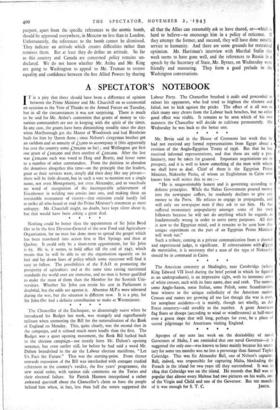Mr. Bevin said in the House of Commons last week
that he had not received any formal representations from Egypt about a revision of the Anglo-Egyptian Treaty of 1936. But that he has received informal representations, and that these are only a pre- liminary, may be taken for granted. Important negotiations. are in prospect, and it is well to know something of the men with whom we shall have to deal. Chief of them is the Egyptian Prime Minister, Nokrashy Pasha, of whom an Englishman in Cairo who knows him well writes this to me :— " He is unquestionably honest and is governing according to definite principles. While the Nahas Government poured money into the newspaper coffers, he resolutely declines to give any money to the Press. He refuses to engage in propaganda, and will only see newspaper men if they ask to see him. He has suffered momentary unpopularity amongst some of his own followers because he will not do anything which he regards as fundamentally wrong in order to serve party purposes. All this is new to the Egyptian mind, and it remains to be seen how this unique experiment on the part of an Egyptian Prime Minister will work out."
Such a tribute, coming in a private communication from a shrewd and experienced judge, is significant. If conversations with egypt do materialise, it is necessary that a man of the type of Nokrashy should be in command in Cairo.
* * * *






























 Previous page
Previous page